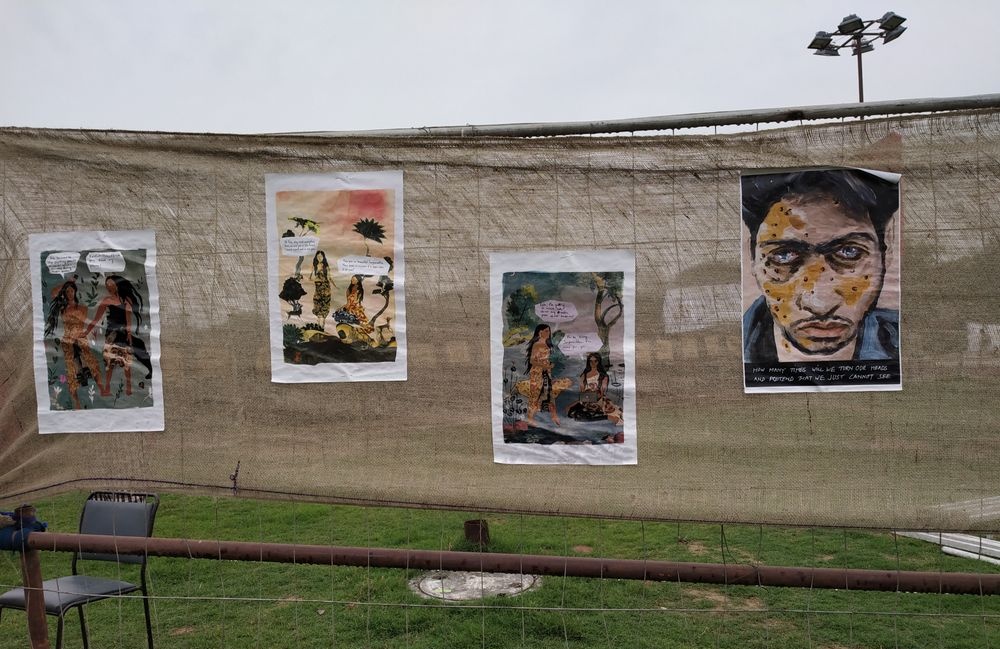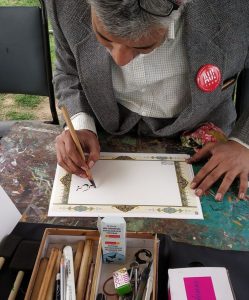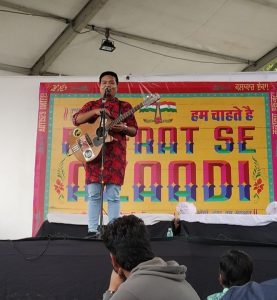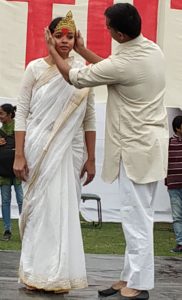On an unusually cold March morning, dozens of people scurried about the Red Fort grounds, fixing microphones, checking the stages, ensuring that all the art exhibits dotting the sprawling lawn were all good to go. They were preparing for the Delhi edition of ‘Artists Unite’ – a two-day event organised by an artists collective featuring singers, poets, filmmakers, visual and performance artists who came together to ask for freedom – from hate. The same collective held events in Chennai and Bengaluru.

Posters of war casualties at the entrance of the venue. Image credit: Tanya Jha.
Banned plays and satire
One of the biggest draws was the long list of artists who’ve faced flak for being critical of the government.
On day one of the event, while a calligrapher from old Delhi was busy writing Bertolt Brecht’s famous quote: “In dark times. Will there be singing? Yes, there will also be singing. About the dark times” for an attendee, a group of actors was performing Abhishek Majumdar’s play Eidgah ki Jinnat on the nearby stage.

A calligrapher from old Delhi writing playwright Bertolt Brecht’s quote. Image credit: Tanya Jha.
This production of the play, which portrays the harshness of life in Kashmir, went off uninterrupted; but only a few days ago, another production was disrupted when some protesters stormed into Jaipur’s Jawahar Kala Kendra alleging that the play “showed army in the bad light.”
After that, another satirist-turned-politician Daniel Langthasa, performed to an enthusiastic crowd without suffering any trolling. Also known as Mr India, Langthasa, in 2017, faced a lot of flak on social media when he posted pictures criticising the BJP for letting former militants gain positions of power in Assam.
Unfazed by the old trolling, he took to the stage and performed politically charged content – taking a jibe at politicians for ignoring Assamese tea workers’ issues and also criticising the Lok Sabha for passing the Citizenship Amendment Bill.

Singer-turned-politician Daniel Langthasa performed a satirical piece on cow vigilantes. Image credit: Tanya Jha.
Voices against misogyny
Apart from freedom of artistic expression, critiquing misogyny was another widely presented theme at the event.
While Delhi-based poet, Sabika Abbas Naqvi performed a piece on breaking away from the shackles of Brahminical patriarchy, stand-up comic Vipasha Malhotra strummed her ukelele to a song about the objectification of women, satirically titled Feminism Should Die.
Later that day, a group of actors portrayed the reductive, patriarchal ways in which nationalism uses ‘Bharat Mata’ – an actor dressed as Bharat Mata walked onto the stage only to be decorated and slapped multiple times by the other male actors, as a haunting patriotic score played in the background. With tears of hurt and anger in her eyes, she descended the stage and stared into the eyes of the spectators, and after a long pause, left the place.

An actor dressed as Bharat Mata at the event. Image credit: Tanya Jha.
As she walked away, some members of the collective strolled around the area, carrying a giant banner that read “Save the Constitution”.
Songs about peace
The day ended with a series of musical performances by artists including Harshpreet, Dhruv Sangri, Rabbi Shergill and many others who not only sang self-composed songs about defeating hate with love but also re-created compositions by Urdu poets like Faiz Ahmed Faiz and Paash. The following evening’s performers included Sonal Kalra and Shubha Mudgal.

Singer Harshpreet performing Faiz Ahmed Faiz ‘bol ke lab azaad hain tere’. Image credit: Tanya Jha.
Alongside, the event also had dastangoi (traditional form of oral storytelling) performances. Early in the morning, India’s first female dastango Fouzia Dastango and Firoz Khan recited dastaan-e-Gandhi, describing the life and work of Mahatma Gandhi. While doing so, they also stressed the importance of non-violence in the present.
The day concluded with everyone dancing to the tunes of reggae artists Begum X and Delhi Sultanate, drowning out the noise of all the war-mongering online.